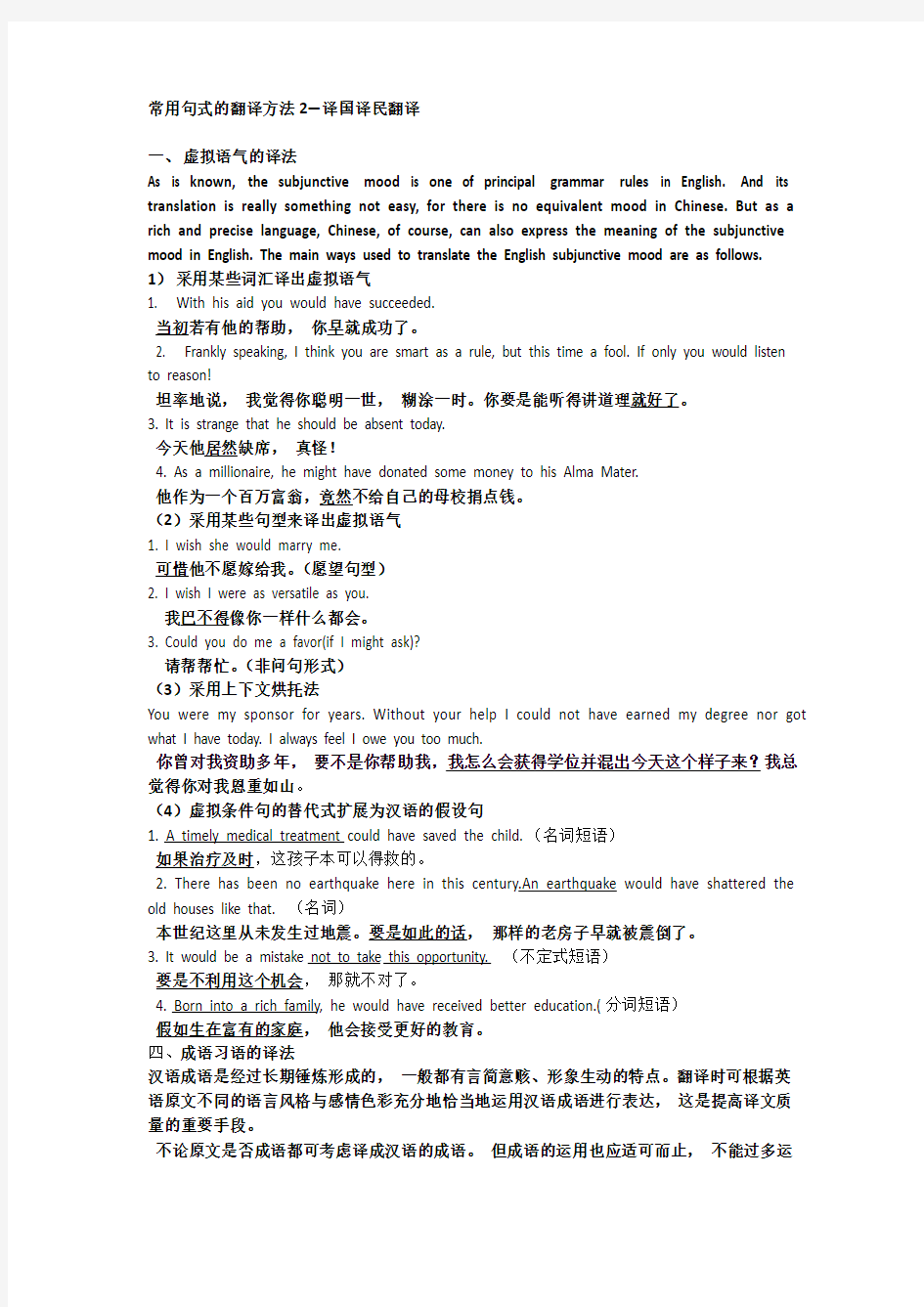
常用句式的翻译方法2
- 格式:docx
- 大小:23.27 KB
- 文档页数:3


常用句式的翻译方法2—译国译民翻译
一、虚拟语气的译法
As is known, the subjunctive mood is one of principal grammar rules in English. And its translation is really something not easy, for there is no equivalent mood in Chinese. But as a rich and precise language, Chinese, of course, can also express the meaning of the subjunctive mood in English. The main ways used to translate the English subjunctive mood are as follows. 1)采用某些词汇译出虚拟语气
1. With his aid you would have succeeded.
当初若有他的帮助,你早就成功了。
2. Frankly speaking, I think you are smart as a rule, but this time a fool. If only you would listen to reason!
坦率地说,我觉得你聪明一世,糊涂一时。你要是能听得讲道理就好了。
3. It is strange that he should be absent today.
今天他居然缺席,真怪!
4. As a millionaire, he might have donated some money to his Alma Mater.
他作为一个百万富翁,竟然不给自己的母校捐点钱。
(2)采用某些句型来译出虚拟语气
1. I wish she would marry me.
可惜他不愿嫁给我。(愿望句型)
2. I wish I were as versatile as you.
我巴不得像你一样什么都会。
3. Could you do me a favor(if I might ask)?
请帮帮忙。(非问句形式)
(3)采用上下文烘托法
You were my sponsor for years. Without your help I could not have earned my degree nor got what I have today. I always feel I owe you too much.
你曾对我资助多年,要不是你帮助我,我怎么会获得学位并混出今天这个样子来?我总觉得你对我恩重如山。
(4)虚拟条件句的替代式扩展为汉语的假设句
1. A timely medical treatment could have saved the child.(名词短语)
如果治疗及时,这孩子本可以得救的。
2. There has been no earthquake here in this century.An earthquake would have shattered the old houses like that. (名词)
本世纪这里从未发生过地震。要是如此的话,那样的老房子早就被震倒了。
3. It would be a mistake not to take this opportunity. (不定式短语)
要是不利用这个机会,那就不对了。
4. Born into a rich family, he would have received better education.(分词短语)
假如生在富有的家庭,他会接受更好的教育。
四、成语习语的译法
汉语成语是经过长期锤炼形成的,一般都有言简意赅、形象生动的特点。翻译时可根据英语原文不同的语言风格与感情色彩充分地恰当地运用汉语成语进行表达,这是提高译文质量的重要手段。
不论原文是否成语都可考虑译成汉语的成语。但成语的运用也应适可而止,不能过多运
用或追求,尤其要强调运用恰当。否则,会损伤原意。过多运用成语也会有华而不实之嫌。
(1)原文中的单词译作成语
1. To many Americans, China is still a faraway place---unknown, unseen, and fascinating.
时至今日,仍然有许多美国人觉得中国远在天涯海角,鲜为人知,令人心弛神往。
2. Love is a climate---a climate of the heart.
爱是一种气氛---一种心心相印的气氛。
(2)原文中的短语译作成语
1. The problems of the human environment are, to some of us, an old story.
人类环境问题对我们中某些人来说是老生常谈。
2. David, handsome, clever, and rich, with a comfortable home and happy disposition, seemed to unite some of the best blessings of existence.
大卫英俊,聪明,富有、家庭舒适、天性开朗,称得上得天独厚。
(3)原文中的成语处理
1. Well, there is no need for us to beat around the bush.
我们现在没有必要旁敲侧击。
2. Why do you love to find fault with someone? It seems that the only person who is always right is yourself.
你为什么总爱吹毛求疵,你以为只有你自己总是对的。
5、其它动词形式的译法
动词是英语句子中最活跃的成分。就时态来说,有现在时、过去时、进行时、完成时等;就语气来说,有虚拟语气、情态语气;就非谓语形式来说,有现在分词、过去分词、动名词、不定式等。它们的语法形式相差不多,但意义不同。如不注意它们的变化及其语法意义,就很容易造成误译。因此,注意动词的各种表现形式,分析其变化的意义,对确保译文的准确性很重要。
(1)动词时态变化的含义
1. Many of life’s problems which were solved by asking family members, friends or colleagues are beyond the capability of the extended family to resolve.
许多以前可以通过问家里人,问朋友或同事能解决的生活中问题是现在大家庭无力解决的。
2. First of all, it seems that a successful scientist is full of curiosity---he wants to find out how and why the universe works.
首先,有成就的科学家似乎总是充满了好奇心---他们总想找出宇宙万物运动的方式和原因。(2)情态动词的不同含义
情态动词的意义最多,最不稳定。像should, would, could, must 等可以表示很多情态意义。要准确地译出其意,除了掌握情态动词的基本意义之外,最主要是根据上下文和与其搭配的词来判断。
Examples:
1. He was astounded but highly pleased that the man who presided over the destinies of the mighty British Empire should come pleading to him.
他又惊又喜,那位掌握着大英帝国命运的人居然来向他央求。
2. He would watch a coach or player demonstrate a difficult maneuver, then he would try it himself. Inevitably, he would master the maneuver within minutes.
他往往先是观察教练员或运动员示范难的动作技巧,然后总是自己试着练。结果常常是只有几分钟他就学会了。